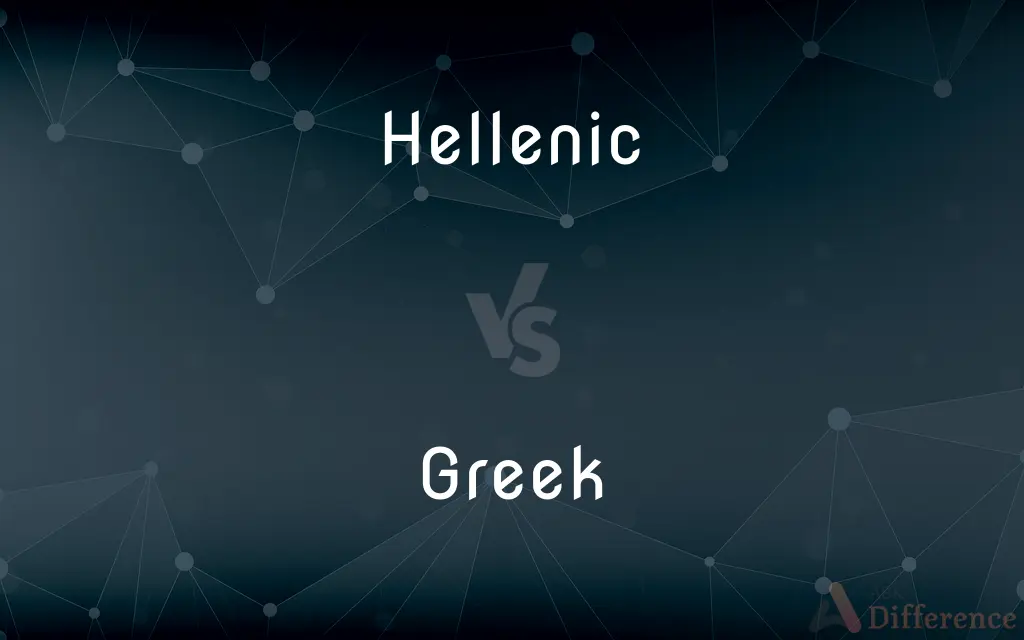Hellenic vs. Greek — What's the Difference?
By Tayyaba Rehman & Fiza Rafique — Updated on April 4, 2024
Hellenic refers to ancient Greek culture and history, while Greek encompasses all things related to Greece, ancient and modern.

Difference Between Hellenic and Greek
Table of Contents
ADVERTISEMENT
Key Differences
Hellenic culture and history are rooted in the ancient period of Greece, focusing on classical antiquity and its contributions to art, philosophy, and governance. This term specifically pertains to the era and elements before the rise of Rome, embodying the ideals and achievements of ancient Greek civilization. On the other hand, Greek relates to anything associated with the country of Greece, spanning its language, people, modern culture, and history. It includes both ancient traditions and contemporary practices, making it a broader term that encompasses Hellenic as a subset.
While Hellenic primarily refers to aspects from the classical period of Greece, emphasizing intellectual and artistic achievements, Greek extends to the language spoken in Greece today and its dialects. The Greek language, with its long history, serves as a living connection between the ancient and the modern world, demonstrating the evolution of cultural and linguistic elements from Hellenic to contemporary Greek society.
Hellenic art and architecture, celebrated for their innovation and influence on Western culture, highlight the emphasis on harmony, proportion, and balance. Whereas, Greek art and architecture also include Byzantine and modern contributions, showcasing a continuum of styles and influences that reflect the country's long and varied history.
In terms of religion, Hellenic often refers to ancient Greek polytheism, with its pantheon of gods and goddesses and mythological stories. On the other hand, Greek encompasses the predominant Christian Orthodox faith of modern Greece, alongside ancient beliefs, showing the religious transformation over centuries.
The study of Hellenic history is focused on understanding the political, social, and cultural dynamics of ancient Greece, from the Minoan and Mycenaean civilizations to the Hellenistic period. Greek history, however, encompasses the entirety of Greece's past, including its role in the Byzantine Empire, Ottoman rule, and its modern statehood, illustrating the country's resilience and adaptability through time.
ADVERTISEMENT
Comparison Chart
Time Period
Ancient Greece, up to the rise of Rome
All periods, ancient to modern
Language
Ancient Greek
Modern Greek and its dialects
Culture
Classical antiquity, arts, philosophy
Includes both ancient and modern elements
Art and Architecture
Focus on harmony, proportion (Parthenon)
Includes Byzantine, modern styles
Religion
Ancient Greek polytheism
Primarily Christian Orthodox, plus ancient
Compare with Definitions
Hellenic
Of or pertaining to the classical period of Greece.
Hellenic architecture is characterized by its symmetry and beauty.
Greek
Relating to the country, language, or culture of Greece.
Greek cuisine is known for its flavorful dishes.
Hellenic
Relating to ancient Greek culture.
The Hellenic era is known for its groundbreaking philosophies.
Greek
Associated with the people of Greece.
Greek hospitality is famous worldwide.
Hellenic
Associated with the ancient Greeks' way of life.
Hellenic traditions include the Olympic Games.
Greek
Of or pertaining to both ancient and modern Greece.
Greek history is studied from the Bronze Age to today.
Hellenic
Pertaining to the history of ancient Greece.
Hellenic studies explore the origins of democracy.
Greek
Referring to the modern Greek language and its dialects.
Learning Greek opens up a wealth of literature and history.
Hellenic
Referring to the ancient Greek language.
Hellenic texts provide insight into early Western thought.
Greek
Pertaining to Greece's contribution to art and science.
Greek innovations continue to influence the modern world.
Hellenic
Of or relating to the ancient Hellenes, their language, or their history; Greek.
Greek
The Indo-European language of the Greeks.
Hellenic
The branch of the Indo-European language family that consists only of Greek.
Greek
Greek language and literature from the middle of the eighth century BC to the end of the third century AD, especially the Attic Greek of the fifth and fourth centuries BC.
Hellenic
Of or pertaining to the Hellenes, or inhabitants of Greece; Greek; Grecian.
Greek
A native or inhabitant of Greece.
Hellenic
The dialect, formed with slight variations from the Attic, which prevailed among Greek writers after the time of Alexander.
Greek
A person of Greek ancestry.
Hellenic
The Hellenic branch of the Indo-European family of languages
Greek
(Informal) A member of a fraternity or sorority that has its name composed of Greek letters.
Hellenic
Characteristic of the ancient Greek and Roman cultures
Greek
(Informal) Something that is unintelligible
Quantum mechanics is Greek to me.
Hellenic
Relating to or characteristic of the classical Greek civiliHzation
Greek
Of or relating to Greece or its people, language, or culture.
Hellenic
Of or relating to or characteristic of Greece or the Greeks;
Greek mythology
A grecian robe
Greek
Alternative case form of Greek.
Greek
Alternative case form of Greek.
Greek
To display a placeholder (instead of text), especially to optimize speed in displaying text that would be too small to read.
Greek
To fill a template with nonsense text (particularly the Lorem ipsum), so that form can be focused on instead of content.
Greek
Of or pertaining to Greece or the Greeks; Grecian.
Greek
A native, or one of the people, of Greece; a Grecian; also, the language of Greece.
Greek
A swindler; a knave; a cheat.
Without a confederate the . . . game of baccarat does not . . . offer many chances for the Greek.
Greek
Something unintelligible; as, it was all Greek to me.
Greek
The Hellenic branch of the Indo-European family of languages
Greek
A native or inhabitant of Greece
Greek
Of or relating to or characteristic of Greece or the Greeks;
Greek mythology
A grecian robe
Common Curiosities
What defines Hellenic culture?
Hellenic culture is defined by the intellectual, artistic, and philosophical achievements of ancient Greece.
How does Greek cuisine reflect the country's history?
Greek cuisine reflects a blend of local and external influences, showcasing the country's historical interactions.
Can modern Greeks understand ancient Hellenic texts?
With study, modern Greeks can understand ancient texts, though ancient Greek is significantly different from the modern language.
How is Greek education influenced by Hellenic traditions?
Greek education retains a focus on classical education, emphasizing the study of ancient Greek language, philosophy, and history.
How have Hellenic and Greek contributions to science differed?
Hellenic contributions were foundational in disciplines like mathematics and astronomy, while modern Greek contributions span various scientific fields.
How does Greek language today differ from ancient Greek?
Modern Greek has evolved from ancient Greek, featuring changes in syntax, pronunciation, and vocabulary.
Are Hellenic and Greek art the same?
Hellenic art refers specifically to the art of ancient Greece, while Greek art includes all art from ancient to modern times.
Is Greek religion today the same as in Hellenic times?
No, ancient Greek religion was polytheistic, while the majority of Greeks today follow Christian Orthodoxy.
How do modern Greeks celebrate their Hellenic heritage?
Modern Greeks celebrate their Hellenic heritage through festivals, educational programs, and preservation of historical sites.
What is the significance of Hellenic architecture?
Hellenic architecture is significant for its introduction of elements like columns and pediments, influencing Western design.
What role does mythology play in Hellenic culture?
Mythology played a central role in explaining natural phenomena and human qualities through stories of gods and heroes.
How does the geography of Greece affect its culture?
Greece's geography, with its seas and mountains, has fostered a maritime tradition and regional diversity in culture and food.
What are the differences between Hellenic and Greek sports?
Hellenic sports were part of religious festivals, like the Olympics; modern Greek sports also include international competitions.
Why is Hellenic philosophy important today?
Hellenic philosophy lays foundational concepts in ethics, politics, and metaphysics, influencing contemporary thought.
What is the difference between Hellenic and Byzantine art?
Hellenic art focuses on realism and ideal forms, while Byzantine art is more religious and iconic, emphasizing spirituality.
Share Your Discovery

Previous Comparison
Miss vs. Sister
Next Comparison
Bartender vs. PublicanAuthor Spotlight
Written by
Tayyaba RehmanTayyaba Rehman is a distinguished writer, currently serving as a primary contributor to askdifference.com. As a researcher in semantics and etymology, Tayyaba's passion for the complexity of languages and their distinctions has found a perfect home on the platform. Tayyaba delves into the intricacies of language, distinguishing between commonly confused words and phrases, thereby providing clarity for readers worldwide.
Co-written by
Fiza RafiqueFiza Rafique is a skilled content writer at AskDifference.com, where she meticulously refines and enhances written pieces. Drawing from her vast editorial expertise, Fiza ensures clarity, accuracy, and precision in every article. Passionate about language, she continually seeks to elevate the quality of content for readers worldwide.











































